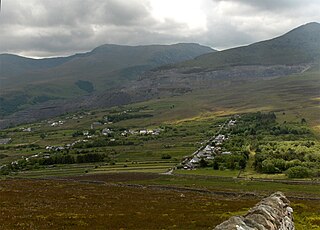
MynyddLlandygái is a small, partly forested hill in Gwynedd, North Wales. It forms the start of the Glyderau ridge.
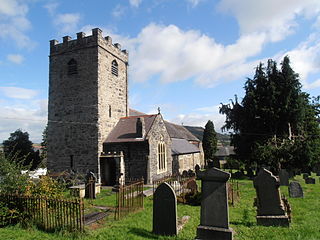
Saint Mael and Saint Sulien's Church is a church located in the town of Corwen in Denbighshire in Wales. It was formerly located in the ancient county of Merionethshire.

Saint Afan of Builth was an early 6th-century Welsh bishop, martyr, and saint. His feast day is generally placed on 17 November, although the Demetian Calendar formerly used in southern Wales placed it on the 16th; it is no longer observed by either the Anglican or Catholic church in Wales.

Llandygái is a small village and community on the A5 road between Bangor and Tal-y-bont in Gwynedd, Wales. It affords a view of the nearby Carneddau mountain range. The population of the community taken at the 2011 Census was 2,487. Llandygái community includes nearby Tregarth and Mynydd Llandygái and also the pass of Nant Ffrancon.
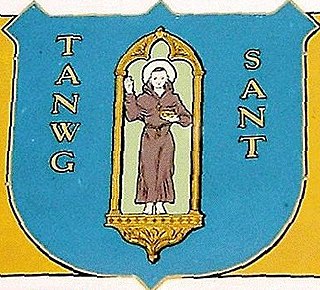
Saint Tanwg is the patron saint of Llandanwg, Gwynedd, Wales. He is presumed to be the founder of St Tanwg's Church, the small church at Llandanwg near Harlech, although the presence of an inscribed stone which has been dated to the 5th century suggests the church was already in existence when Tanwg and his brothers arrived in the area early in the 6th century. This Llandanwg Stone is inscribed with two names, one being Ingenui ; the other is indecipherable. The stone is not local. It is thought to have come from the Wicklow Hills in Ireland. This means that it was probably brought over by a rich person. It is a reasonable conjecture that Ingenuus may have been the founder of the church in the late fifth century, and that St. Tanwg lived at this llan a generation or two later. Another stone, called the Equester Stone, is of 6th century date. It is inscribed Equestrinomine, an unusual form of wording otherwise known only from 4th century inscriptions in Italy and Gaul.
Saint Cadfan, sometimes Anglicized as Gideon, was the 6th century founder-abbot of Tywyn and Bardsey, both in Gwynedd, Wales. He was said to have received the island of Bardsey from Saint Einion Frenin, king of Llŷn, around 516 and to have served as its abbot until 542.

Saint Twrog's Church is in the village of Maentwrog in the Welsh county of Gwynedd, lying in the Vale of Ffestiniog, within the Snowdonia National Park. It is in the Deanery of Ardudwy. It is designated by Cadw as a Grade II listed building.
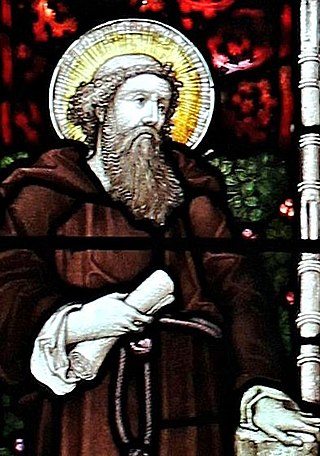
Saint Twrog - feast day 26 June - was a 6th-century Welsh saint who founded the church at Maentwrog, having come to Wales early in the Age of the Saints.
Ithel Hael or Ithel Hael o Lydaw was a prince of Armorica who lived in the early part of the sixth century. He was the father of Baglan, Flewyn, Gredifael, Tanwg, Twrog, Tegai, Trillo, Tecwyn and Llechid, saints who accompanied Cadfan to Britain.
Saint Tecwyn is the patron saint and founder of Llandecwyn in the Welsh county of Gwynedd.
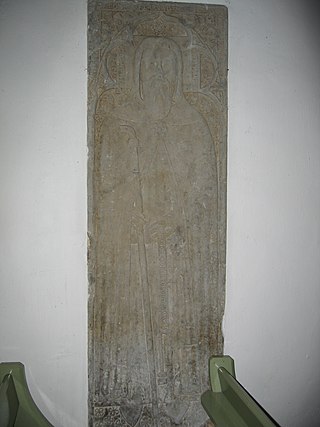
Iestyn was a Welsh hermit and confessor in the 6th or 7th century who is venerated as a saint. He was the founder of two churches, one in Gwynedd and another in Anglesey, both in north Wales.
Saint Peulan was a Welsh holy man in the early part of the 6th century, the son of Paulinus, a saint from south Wales who taught Saint David. A follower of Cybi, a saint associated with the island of Anglesey in north Wales, Peulan is commemorated in the dedication of the church he reportedly founded, St Peulan's Church, Llanbeulan, on Anglesey.
Elaeth was a Christian king and poet in Britain in the 6th century who is venerated as a saint. After losing his territory in the north of Britain, he retreated to Anglesey, north Wales, where he lived at a monastery run by St Seiriol at Penmon. Some religious poetry is attributed to him, as is the foundation of St Eleth's Church, Amlwch, also in Anglesey.

Saint Flewyn is the patron saint and founder of St Fflewin's Church, Llanfflewin, in Anglesey, Wales.

Saint Gredifael is the patron saint and founder of St Gredifael's Church, Penmynydd, in Anglesey, Wales.
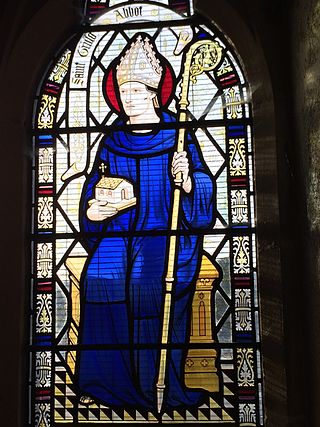
Saint Trillo is the patron saint and founder of the churches at Llandrillo, Denbighshire and Llandrillo yn Rhos, Rhos-on-Sea in Conwy County Borough, Wales.
Glyn Tegai Hughes was a Welsh scholar, writer and literary critic. He was a Liberal Party politician and Welsh nationalist.
Saint Gwrthwl is a Pre-Congregational Saint of Powys in Wales.

A Saint Ilar is listed among the 6th-century saints of Wales and is the probable namesake of Llanilar in Ceredigion and its former hundred of Ilar. His feast day is variously given as 13, 14, or 15 January, but is no longer observed by either the Anglican or Catholic church in Wales.

Hugh Hughes (Tegai) was a Welsh minister and poet.













